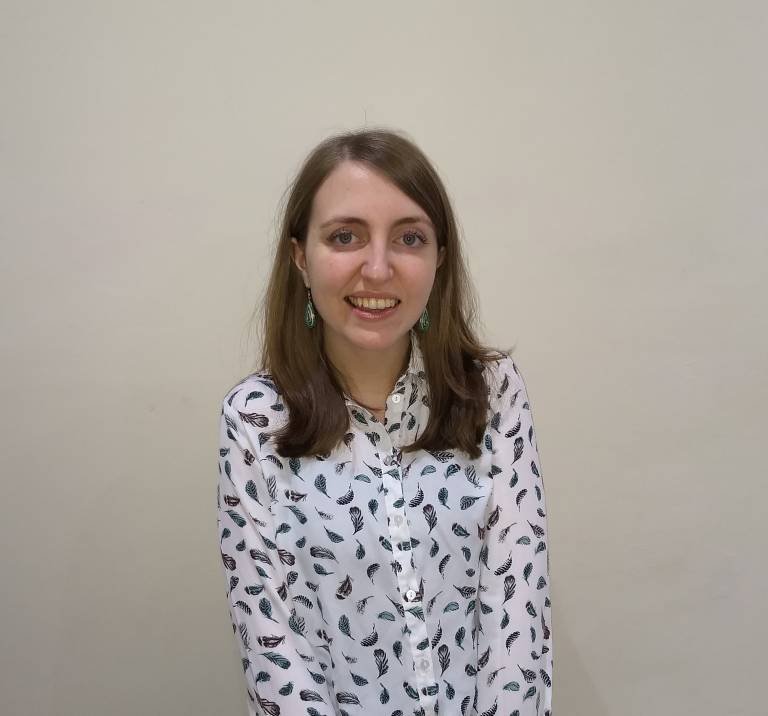UCL History welcomes Dr Jane Dinwoodie, who joins us as a Lecturer in American History
22 August 2020
UCL History is delighted to welcome Dr Jane Dinwoodie to the department, where she joins us as a Lecturer in American History. We chatted with Jane about her research interests and what advice she has for new and returning students.

Hi Jane – welcome to the department! Can you tell us a little about yourself?
Thanks, I’m delighted to be here! I’m a historian of the United States and Indigenous America. At UCL, I’ll be a lecturer in Nineteenth-century American history. I received my doctorate from Oxford University in 2017. Before coming to UCL, I was a Research Fellow at Cambridge University and an Advisory Council Dissertation Fellow at the McNeil Center for Early American Studies at the University of Pennsylvania. I’m originally from Plymouth, in the southwest of the UK – a city where histories of the Mayflower and early British colonization attempts in the Americas play an outsized role in local history narratives. My fascination with these stories as a child played a big role in me becoming a historian of America, despite having no other prior ties to the US. When I’m not teaching, researching, and writing, I enjoy cooking, watching a range of shows on Netflix, and (as my partner is from Japan) learning Japanese at a very slow pace!
What does your research focus on?
Broadly, my research focuses on Indigenous America and, at the moment, the nineteenth-century American South. I’m currently working on my first book project, tentatively titled, We Remain: Indian Non-Removal in the Nineteenth-century American South. The book centres on Indian removal – a wave of federally-sponsored efforts to forcibly relocate Eastern Indigenous nations to lands west of the Mississippi River, which peaked following the Indian Removal Act of 1830 – and the thousands of individuals, families, and communities that successfully avoided it. By ranging across the region and its polities, We Remain tells the story of Indian non-removal in the South as a massive cross-regional phenomenon which affected not only Indigenous Southerners but also American officials, local residents, and continental dynamics of sovereignty, state development, and American empire.
That sounds interesting! Which courses will you be teaching on this year, and how will they link with your research?
This year, I’ll be teaching two courses: “The Disunited States: Contested Visions of America, 1775-1860” (a second and third year undergraduate thematic module) and “Nations, Empires, and Homelands: Key Themes in Nineteenth-century Native American History” (an MA module). Both spring from my research interests and a wealth of fascinating new scholarship on nineteenth-century America and Indigenous history. My MA course offers a survey of nineteenth-century Native American history and historiography. As well as providing an overview of Indigenous history in this period, the course explores different approaches to writing Indigenous histories, the ethical considerations at stake, and these histories’ deep resonances for the present. Meanwhile, my thematic module seeks to broaden conceptions of the American past by exploring the numerous alternate, & often subversive, visions of America’s future which people throughout the continent imagined before 1860. These range from proslavery Southern imperialists in Nicaragua and Mormon nation-builders in Utah to Indigenous nations resisting removal in the South and Great Lakes and a same-sex couple in 1820s Vermont. Together, these stories showcase a complex, unfamiliar history of the United States and its development, revealing a deeply contested space where communities vied for very different futures, sometimes in struggles that persist to this day.
What are you most looking forward to about starting at UCL History?
I’m really looking forward to working in such a fantastic, globally renowned history department and to teaching UCL’s excellent undergraduate students. Also, I’m very excited to learn from all my new colleagues who work on very different regions and periods to myself, and to collaborate with them to better understand shared interests, such as histories of the environment, empires, and colonization throughout the world.
We have lots of new students joining us in September, and many returning for their second and third years. What advice would you give to these young historians?
To stay curious about the past – lots of us are drawn to history degrees because we’re inquisitive or find something in the past we want to know more about – and remember that everything has a history that can be explored. Literally everything in our modern world is a product of past events, whether that’s statues of colonizers and slaveholders, urgent social and political phenomena like police brutality & structural racism, or comparatively more trivial things like why we eat certain foods at certain festivals. I think studying the past is one of the best ways that we can understand the present and, in fact, can fundamentally change the ways we see the world. Historical study offers a great opportunity to educate ourselves about unfamiliar processes and events and to empathize with others’ experiences that may be very far from our own. By studying how the world came to be and how it could have been otherwise, we can understand so much more about ourselves and others, past and present, as well as possibilities for the future. This is especially true when we explore histories – particularly violent and painful ones like the history of colonialism – that continue to shape the world today. So I’d encourage you to study as wide a range of topics as you can, especially things you know nothing about, and to sustain the curiosity and interest that likely brought you to a history degree in the first place!
 Close
Close

